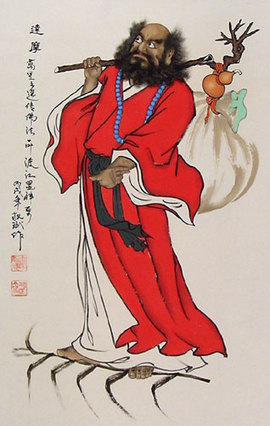The character, Gaspar (the second “wise-man”), was created by Christopher Moore to represent the historical figure Bodhidharma (moore, 440). Bodhidharma was an Indian patriarch of Buddhism that was said to have introduced China to Buddhism around 500 A.D. Bodhidharma was also reported to have been the founder of Zen school of Buddhism (ER 994). There are many debates on the authenticity of Bodhidharma and his creation of Zen school. The most reliable source for the life of Bodhidharma is the Xu gaoseng zhuan, written in 645 by Duaxuan. This source declares Bodhidharma to be a Brahman from southern India, and defines Bodhidharma as the patriarch for Zen school. After the establishment of Zen’s orthodoxy, the new school became the main trend of Chinese Buddhism and its “founder” Bodhidharma became legendary (994).
The Zen Buddhist sect in Japan consists of three main schools, with several other movements based on Zen meditation, altogether consisting of about 100 temples and 200,000 followers (ER 9943). Today, Zen is admired for its spiritual practices, including strict discipline and contemplation of “riddles” (life’s questions). The training and practicing of the Zen school consists of sitting meditation and Zen master and student interaction through dialogue (9943). In Moore’s book, Lamb, Joshua experiences enlightenment, meaning (in his words): “I’ve let go of everything. I have achieved perfect freedom” (Moore 228). Through his enlightenment stage, Joshua learns to have compassion for his fellow humans and to be a bodhisattva (a savior) for his people. These ideas spring from the practices of Zen, that self- realization comes from meditation and contemplation (9944). Zen teachings also emphasize the importance of post-enlightenment thought; meaning that practice of Zen must not end at the time of realization, but should continue through life and be integrated in each aspect of living (9944).
Although the teachings of Buddha could have been widespread throughout Christ's childhood, Buddhism did not reach China until about 500 A.D. and therefore could not have been taught to young Jesus during this time. Moore was purposefully historically inaccurate during this section of the book to allow for Joshua’s enlightenment. Throughout this section, Joshua learns the importance of loving all men (compassion), turning the other cheek, and being a leader for his people. These are all important aspects of Jesus’ life in the gospels and Moore wanted to include obvious and humorous historical inaccuracies in order to create new possibilities about the history behind Christ's teachings.
The Zen Buddhist sect in Japan consists of three main schools, with several other movements based on Zen meditation, altogether consisting of about 100 temples and 200,000 followers (ER 9943). Today, Zen is admired for its spiritual practices, including strict discipline and contemplation of “riddles” (life’s questions). The training and practicing of the Zen school consists of sitting meditation and Zen master and student interaction through dialogue (9943). In Moore’s book, Lamb, Joshua experiences enlightenment, meaning (in his words): “I’ve let go of everything. I have achieved perfect freedom” (Moore 228). Through his enlightenment stage, Joshua learns to have compassion for his fellow humans and to be a bodhisattva (a savior) for his people. These ideas spring from the practices of Zen, that self- realization comes from meditation and contemplation (9944). Zen teachings also emphasize the importance of post-enlightenment thought; meaning that practice of Zen must not end at the time of realization, but should continue through life and be integrated in each aspect of living (9944).
Although the teachings of Buddha could have been widespread throughout Christ's childhood, Buddhism did not reach China until about 500 A.D. and therefore could not have been taught to young Jesus during this time. Moore was purposefully historically inaccurate during this section of the book to allow for Joshua’s enlightenment. Throughout this section, Joshua learns the importance of loving all men (compassion), turning the other cheek, and being a leader for his people. These are all important aspects of Jesus’ life in the gospels and Moore wanted to include obvious and humorous historical inaccuracies in order to create new possibilities about the history behind Christ's teachings.
The Wisdom of Bodhidharma
"A special transmission outside the scriptures,
Not founded upon words and letters;
By pointing directly to [one's] mind
It lets one see into [one's own true] nature and [thus] attain Buddhahood."
"A special transmission outside the scriptures,
Not founded upon words and letters;
By pointing directly to [one's] mind
It lets one see into [one's own true] nature and [thus] attain Buddhahood."

 RSS Feed
RSS Feed